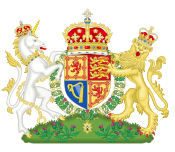- Claim of Right 1989
-
Scotland 
This article is part of the series:
Politics and government of
Scotland- Supreme Court of the United Kingdom
- Supreme Courts
- Sheriff Courts
- Land Courts
- Justice of the Peace Courts
- Lord Lyon Court
Scotland in the UKHer Majesty's Government
Parliament of the United Kingdom
- Scotland Office
- Grand Committee
- Select Committee
- Reserved matters
- Elections
- Constituencies
- List of Scottish MPs
Scotland in the EULocal government
A Claim of Right for Scotland was a document crafted by the Scottish Constitutional Convention in 1988, declaring the sovereignty of the Scottish people. It was signed by all Labour and Liberal Democrat MPs, with the exception of Tam Dalyell (Labour),[1] a strident opponent of devolution.
The Claim of Right was signed at the General Assembly Hall, on the Mound in Edinburgh - on the 30th March 1989 by 58 of Scotland's 72 Members of Parliament, 7 of Scotland's 8 MEPS, 59 out of 65 the Scottish regional, district and island councils, and numerous political parties, churches and other civic organisations, eg. trade unions. The document has never had any legal force, and remains a statement of popular opinion.
The Claim was part of a process which led to devolution of powers from the Parliament of the United Kingdom to a new Scottish Parliament in 1999. Its title was a reference to the Claim of Right Act 1689, an Act of the Parliament of Scotland which limited the power of the Scottish monarch (at the time, William and Mary) in much the same manner as the English Bill of Rights passed the same year.
In October 2011 the Scottish Government announced that the Claim of Right will be brought before the Scottish Parliament to allow MSPs to re-endorse the claims of the sovereignty of the Scottish people.[1]
Contents
Text of the Claim
The Claim of Right reads-
We, gathered as the Scottish Constitutional Convention, do hereby acknowledge the sovereign right of the Scottish people to determine the form of Government best suited to their needs, and do hereby declare and pledge that in all our actions and deliberations their interests shall be paramount.We further declare and pledge that our actions and deliberations shall be directed to the following ends:
To agree a scheme for an Assembly or Parliament for Scotland;
To mobilise Scottish opinion and ensure the approval of the Scottish people for that scheme; and
To assert the right of the Scottish people to secure implementation of that scheme.Legal significance
The Claim of Right has never had or claimed any legal force, but some imbue it with constitutional significance in relation to Scotland.[2]
See also
References
- ^ a b "SNP confirms Claim of Right move". The Press Association. 26 October 2011. http://www.google.com/hostednews/ukpress/article/ALeqM5gmU-hXjMhLg3c_hHgumhV4xg0H-Q?docId=N0275681319574307425A. Retrieved 27 October 2011.
- ^ The Claim of Right of 1988
Categories:- 1989 in politics
- 1989 in Scotland
- Collective rights
- Home rule in the United Kingdom
- Political charters
- Political history of Scotland
- Popular sovereignty
- Proclamations
- Scotland politics stubs
Wikimedia Foundation. 2010.
